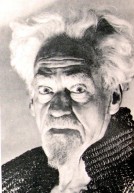(Click on the headings below to go to the different websites.)
The Wica ~ www.thewica.co.uk
 “The Wica” is a website about the people behind the resurgence of interest in modern day Witchcraft. Gerald Gardner (left), who is often considered to be the Father of Modern Day Witchcraft, would refer to its early members as being of ‘The Wica’ – hence the name of this site.
“The Wica” is a website about the people behind the resurgence of interest in modern day Witchcraft. Gerald Gardner (left), who is often considered to be the Father of Modern Day Witchcraft, would refer to its early members as being of ‘The Wica’ – hence the name of this site.
Here you can find brief bios, old documents, newspaper clippings, photos, pictures and the odd mp3 which all help to fill in the pieces of the historical jigsaw of what is probably the only religion that Britain has given to the world – Witchcraft!
Touching Magic: Deliberately Concealed Objects in old Australian Houses and Buildings. ~ www.academia.edu
by Ian Evans
 “An ancient ritual discovered in Australia: objects concealed in buildings in order to decoy evil spiritual beings away from their human occupants. The ritual came to Australia, possibly as early as 1788, as part of the cultural baggage of settlers and convicts. Its practice continued in great secrecy until at least the mid-1930s.”
“An ancient ritual discovered in Australia: objects concealed in buildings in order to decoy evil spiritual beings away from their human occupants. The ritual came to Australia, possibly as early as 1788, as part of the cultural baggage of settlers and convicts. Its practice continued in great secrecy until at least the mid-1930s.”
The thesis by Ian Evans is available to read in full at the link above and also to download in PDF format.
The Secret History of the Witches ~ www.suppressedhistories.net
by Max Dashu
This webpage features excerpts from the book The Secret History of the Witches by historian Max Dashu, as well as many other interesting articles on the website in general, such as The Politics of Witchcraft Studies which was originally published as Another View of the Witch Hunts.
The Triumph of the Moon ~ en.wikipedia.org
 This link goes to the Wikipedia article about the book by Ronald Hutton. The Triumph of the Moon: A History of Modern Pagan Witchcraft is a book of religious history by the English historian Ronald Hutton, first published by Oxford University Press in 1999.
This link goes to the Wikipedia article about the book by Ronald Hutton. The Triumph of the Moon: A History of Modern Pagan Witchcraft is a book of religious history by the English historian Ronald Hutton, first published by Oxford University Press in 1999.
“In many ways Ronald’s work provides us with the history of both how we have seen ourselves and how we have constructed and reconstructed our past(s) over time, and how we continue to do so. He has a very pragmatic, creative attitude, recognising that factual error can still produce beneficial results.” ~ Dave Evans, Historian.
